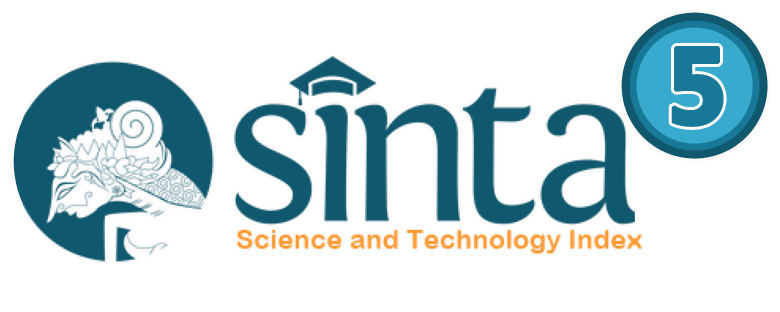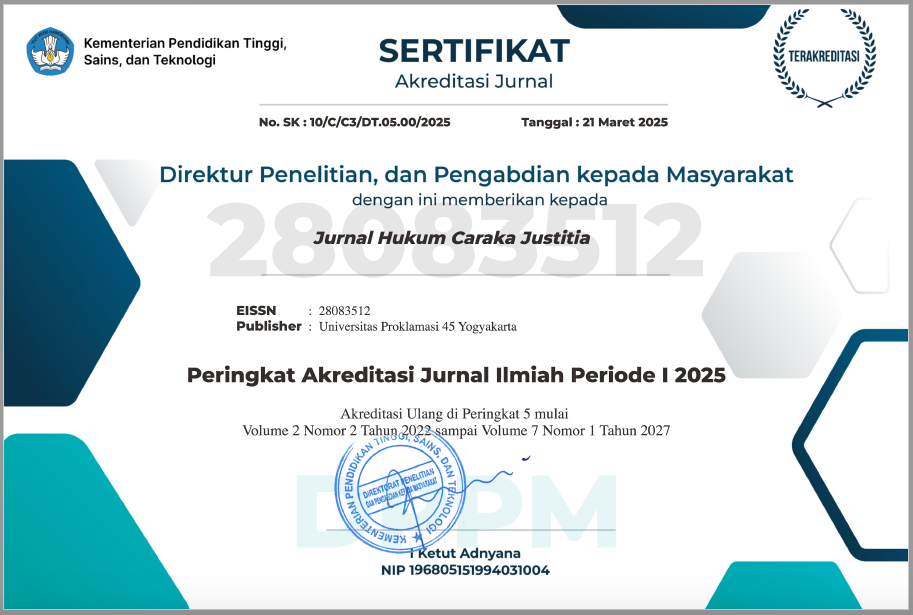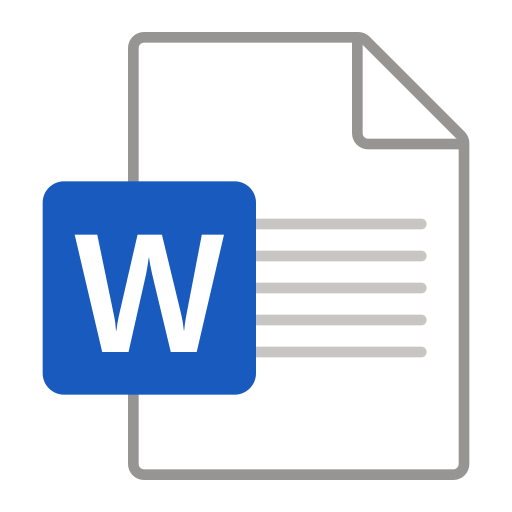Pertanggungjawaban Pidana Terhadap Pelaku Tindak Pidana Menjual Barang Kena Cukai yang Tidak Ditempel Pita Cukai untuk Diedarkan
Studi Putusan Nomor 492/Pid.Sus/2021/PN.Tjk
DOI:
https://doi.org/10.30588/jhcj.v2i1.1032Keywords:
Criminal liability, Excise Stamps.Abstract
The act of counterfeiting excise stamps is not too much of a concern in the community because, in general, people are more interested in big problems or big cases such as crime, terrorism, corruption, and so on. As in the United States, it has offered, delivered, sold, or made available for sale excisable goods that are not packaged for retailers, are not attached with excise stamps, or are not affixed with other excise payment signs in the form of 273,162 cigarettes, as referred to in Article 54 of the Law. Law No.39 of 2007 concerning amendments to Law No.11 of 1995 concerning Excise For his actions, the defendant was sentenced to prison and a fine of twice the excise value. The research method in this paper uses normative and empirical legal research, which is one type of legal research, namely by examining library materials or secondary data of a legal nature. At trial, the panel of judges did not find anything that could absolve the defendant of criminal liability, either as a justification or an excuse, so the defendant must be held accountable for his actions. Because the defendant is capable of being responsible, he must be found guilty and sentenced.
References
Artikel Jurnal
Ali, M. “Sistem Peradilan Pidana Progresif; Alternatif Dalam Penerapan Hukum Pidana”. Jurnal Hukum Ius Quia Iustum 14, no. 2 (April 2017): 210-229. https://journal.uii.ac.id/IUSTUM/article/download/1064/1805.
Axella, Nindy. “Penegakan Hukum Pelaku Tindak Pidana Perdagangan Rokok Tanpa Pita Cukai Berdasarkan Undang-Undang Nomor 39 Tahun 2007”. JOM Fakultas Hukum II, no. 2 (Oktober 2015): 1-15. https://media.neliti.com/media/publications/34365-ID-penegakan-hukum-pelaku-tindak-pidana-peredaran-rokok-tanpa-pita-cukai-berdasarka.pdf.
Erdianto. “Penyelesaian Tindak Pidana yang Terjadi di atas Sengketa Tanah”. Jurnal Ilmu Hukum 3, no. 1 (2012): 1-15. https://media.neliti.com/media/publications/9137-ID-penyelesaian-tindak-pidana-yang-terjadi-di-atas-tanah-sengketa.pdf.
Jainah, Zainab Ampu. “Penegakan Hukum di Masyarakat”. Journal of Rural and Development 3, no. 2 (Agustus 2012): 165-172. https://jurnal.uns.ac.id/rural-and-development/article/view/1882/1782.
Buku
Anwar, Yesmil. Kriminolog. Bandung: Ravika Aditama, 2010.
Arto, Mukti. Praktek Perkara Perdata di Pengadilan Agama. Yogyakarta: Pustaka Pelajar, 2016.
Arto, S. Pengertian Tindak Pidana, Unsur Tindak Pidana, Syarat Melawan Hukum, Kesalahan, Percobaan (Pooging), Gabungan Tindak Pidana (Samenloop), Dan Penyertaan. Jakarta: Bina Laknasa, 2014.
Hamzah, Andi. Pokok-pokok Hukum Pidana. Jakarta: Rineka Cipta, 2008.
Irfanto, Jalu Fajrin. Proses Penyidikan dan Penyidikan Tindak Pidana Pemalsuan Strip Pajak Rokok. Magelang: Universitas Muhammadiyah Magelang, 2019.
Lamintang. Dasar-Dasar Hukum Pidana. Bandung: PT Aditya Bakti, 2011.
Soekanto, Soerjono. Pengantar Penelitian Hukum. Jakarta: UI-Press, 2014.
Soekanto, Soerjono, & Sri Mamudji. Penelitian Hukum Normatif: Suatu Tinjauan Singkat. Jakarta: Raja Grafindo Persada, 2003.
Suharto, & Junaidi Effendi. Panduan Praktis Menghadapi Perkara Pidana, Mulai Dari Proses Penyidikan Hingga Proses Persidangan. Jakarta: Perpustakaan Prestasi, 2010.
Peraturan Perundang-undangan
Undang-Undang Dasar Negara Republik Indonesia 1945 Amandemen Keempat.
Undang-Undang Nomor 1 Tahun 1946 Tentang Kitab Undang-Undang Hukum Pidana (KUHPIDANA) Jo. Undang-Undang Nomor 73 Tahun 1958 Tentang pemberlakuan Undang-Undang Nomor 1 Tahun 1946 tentang Peraturan Hukum Pidana Untuk Seluruh Wilayah Republik Indonesia dan Mengubah Kitab Undang-Undang Hukum Pidana (KUHPIDANA).
Undang-Undang Nomor 8 Tahun 1981 tentang Hukum Acara Pidana.
Undang-Undang Nomor 10 tahun 1995 tentang Kepabeanan.
Undang-Undang Nomor 2 Tahun 2002 Tentang Kepolisian Negara Republik Indonesia.
Undang-Undang Nomor 16 Tahun 2004 Tentang Kejaksaan Republik Indonesia.
Undang-Undang Nomor 39 tahun 2007 tentang perubahan atas Undang-Undang Nomor 11 tahun 1995 tentang Cukai.
Undang-Undang Nomor 48 Tahun 2009 Tentang Kekuasaan Kehakiman.
Peraturan Direktur Jenderal Bea dan Cukai Nomor: KEP-113/BC/2004 tanggal 29 Desember 2004 tentang Penyediaan dan Tatakerja Pemesanan Pita Cukai Hasil Tembakau.
Peraturan Menteri Keuangan Nomor 188/PMK.04/2010 tentang Impor Barang yang Dibawa oleh Penumpang, Awak Sarana, Pengangkut, Pelintas Batas, dan Barang Kiriman. Berita Negara Republik Indonesia Tahun 2010 Nomor 530.
Peraturan Direktur Jenderal Bea dan Cukai Nomor PER-45/BC/2016 tentang Penyediaan dan Pemesanan Pita Cukai.
Peraturan Direktur Jenderal Bea dan Cukai Nomor PER-29/BC/2017 tentang Bentuk Fisik dan/atau Spesifikasi Desain Pita Cukai Hasil Tembakau dan Pita Cukai Minuman yang Mengandung Etil Alkohol Tahun 2018.
Peraturan Menteri Keuangan Republik Indonesia Nomor: 146/PMK.010/2017 Tentang Tarif Cukai Hasil Tembakau.
Putusan Pengadilan
Putusan Pengadilan Negeri Nomor 492/Pid.Sus/2021/Pn.Tjk., perihal Menawarkan Untuk Dijual Barang Kena Cukai Yang Tidak Dilekatkan Pita Cukai, 26 Juli 2021.
Downloads
Published
How to Cite
Issue
Section
License
Copyright (c) 2022 Ahmad Zainal, Lukmanul Hakim, Okta Ainita

This work is licensed under a Creative Commons Attribution 4.0 International License.
Authors who publish with JHCJ agree to the following terms:
Authors retain copyright and grant the JHCJ right of first publication with the work simultaneously licensed under a Creative Commons Attribution 4.0 International License that allows others to share (copy and redistribute the material in any medium or format) and adapt (remix, transform, and build upon the material) the work for any purpose, even commercially with an acknowledgment of the work's authorship and initial publication in JHCJ.
Authors are able to enter into separate, additional contractual arrangements for the non-exclusive distribution of the journal's published version of the work (e.g., post it to an institutional repository or publish it in a book), with an acknowledgment of its initial publication in JHCJ. Authors are permitted and encouraged to post their work online (e.g., in institutional repositories or on their website) prior to and during the submission process, as it can lead to productive exchanges, as well as earlier and greater citation of published work (See The Effect of Open Access).














